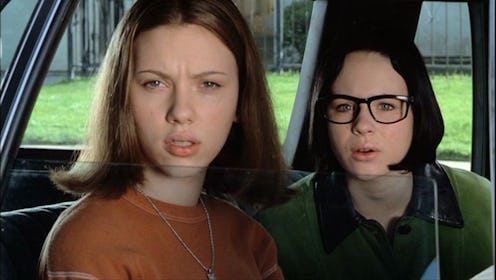Entertainment
'Ghost World' Made Me The Woman I Am Today

I was a weird teenager. This said, is there any other kind? I was — and am — simultaneously an outgoing extrovert and an introvert who found it exhausting to be around other human beings. Maybe this is why the 2001 movie Ghost World felt like such a revelation. The film centers on two teenage girls, and, while it's closely based on the wonderful graphic novel by Daniel Clowes (who co-wrote the script with director Terry Zwigoff), I've rarely seen a movie that so accurately captures the teen girl experience. That is why Ghost World made me the woman I am today.
What you've got to remember is that, back in 2001, there wasn't a huge amount of smart, sensitive media dedicated to the magical beast that is the teenage girl. This was post-My So-Called Life and pre-Rookie magazine, and, while shows like Moesha and Clarissa Explains It All did their part to address the non cookie-cutter teen girl, not a lot of nuanced, smart media was aimed at that particular demographic. Often, movies or TV shows centered on teen girls' dramatic love lives, but, aged 13 and at an all-girls' school, I had no love life to speak of. Just intense best friendships.
Ghost World was the first movie I watched where its main focus wasn't the girls' dating lives, but their friendship with each other and the tensions that arose from their differences. While Enid and Rebecca were both happily unpopular, Enid was more self-consciously introverted while Rebecca was a quiet, chilled extrovert.
The movie's depiction of Enid and Rebecca went against everything I'd learnt from high school movies about "types." Although Enid rocked black lipstick, they weren't goths. Although they were both unpopular, they weren't nerds. They were glorious, nuanced weirdos, who, like me, mixed extrovert and introvert behavior. Enid approached strangers and liked talking with them, but she could also be shy. Rebecca was no-nonsense, but sometimes she wanted to be liked. Sometimes she could be more conventional than Enid and didn't want to be judged by Enid for these aspects of her self.
While watching the movie, I realized that I didn't need to categorize myself. I didn't have to be either an extrovert or an introvert. I could be both. Sure, this sounds painfully obvious now, but, at age 13, it hurt when a friend told me, "It's like you can't decide whether you want to be a cheerleader or a Sylvia Plath-esque poet." It felt like she was attacking me for being inauthentic. Only while watching Ghost World did I realize that having to pick sucked. Even more than that, it was unnecessary. I could be whoever I wanted to be.
Much of what Ghost World preaches is about not making snap judgements. We see this when Enid goes from making fun of Seymour, who she initially meets via a prank phone call, to cultivating a warm, meaningful relationship with him. We also see this with Enid's summer art project, when she takes a racially insensitive promotional poster, researches its history, and makes it "found art" and a "comment about how racism is whitewashed over in our culture." When Enid's piece is exhibited and causes a scandal, nobody asks for the reasons why the piece is displayed or why it's considered to be art. Instead, they exert pressure on the art school to fail Enid and revoke the scholarship she was granted.
Similarly, best friends Enid and Rebecca's differing perspectives on Seymour (with the initial snap judgement Rebecca makes of Seymour being a pathetic loser, which was fairly different from Enid's more nuanced understanding of him) eventually causes a breach in their friendship. Enid is also quick to judge Rebecca when, over the course of the movie, her best friend becomes more conventional, wanting all the things that Enid dismisses as banal, like her own home and a job and a relationship. This is perhaps what was so smart about the movie: it showed how even clever, complicated girls could fall into the trap of judging others' choices without thought or understanding.
I love movies, but it's not everyday that a film radically alters your outlook on the world. Watching Ghost World did that crazy, unlikely thing by making me less judgmental and more ready to embrace what's become the cornerstone of my own feminism: accepting that feminism is all about choice. Accepting that any way a woman chooses to live her life, whether via homemaking or working in an office or worship or making art, is equally valid. Accepting that there's no one way to be a feminist.
We don't have to be cheerleaders or Sylvia Plaths. We can be both. We can be whatever we want to be. And Ghost World taught me that.
Images: United Artists (4)